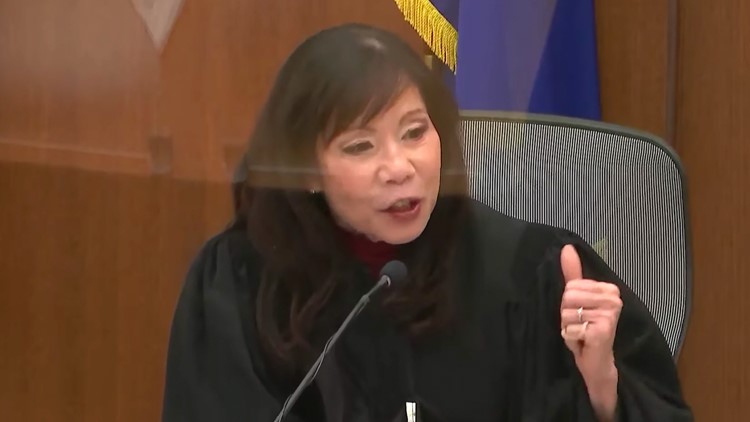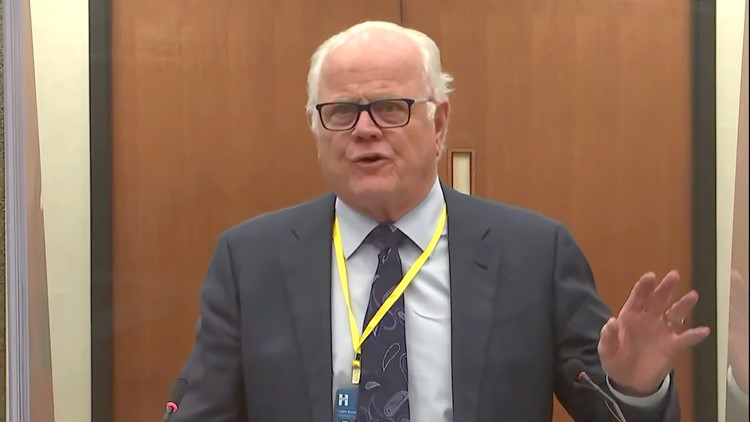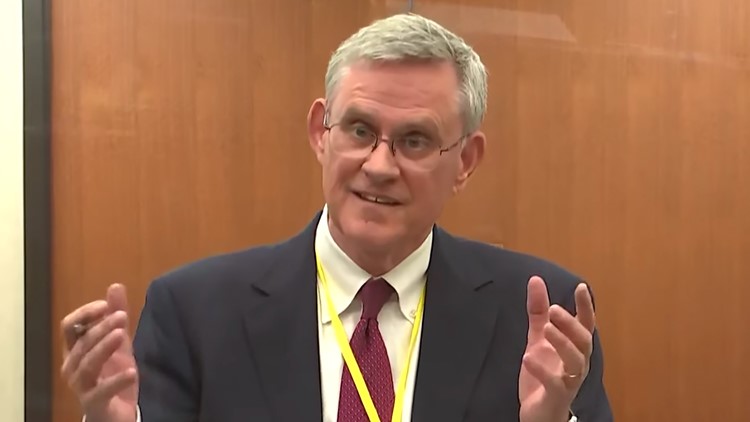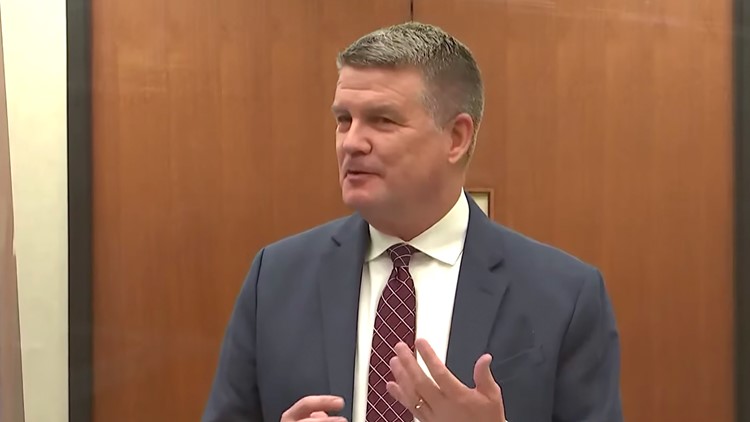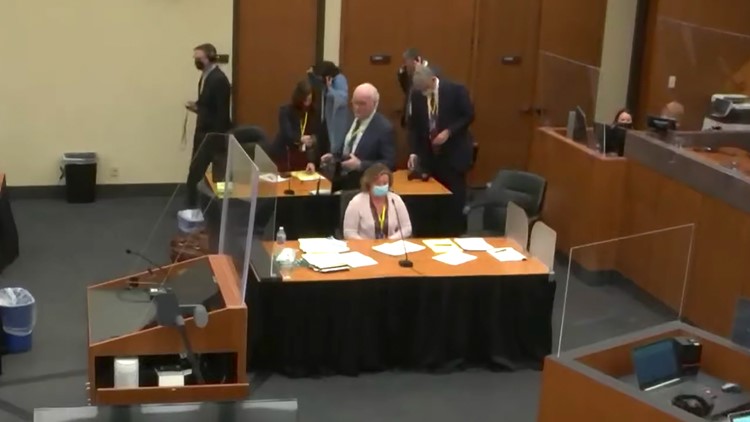MINNEAPOLIS — Editor's Note: The video above originally aired on KARE 11 on Dec. 23, 2021.
The jury in the Kim Potter trial deliberated for about 27 hours over the course of four days before returning guilty verdicts for first-degree manslaughter and second-degree manslaughter. Potter, a former Brooklyn Center police officer, shot 20-year-old Daunte Wright once in the heart while he tried to flee arrest for a warrant on a weapons charge on April 11, 2021. Body worn camera video showed Potter yelling, "Taser, Taser, Taser," before shooting Wright, thinking she held her Taser in her hand instead of her firearm.
One juror shared details of the deliberation with KARE 11. He asked to remain anonymous because of the amount of public animosity involved with the case. KARE 11 reporter Lou Raguse covered the entire case, was inside the courtroom for two days of the trial, and was able to verify the juror's identity.
Immediately following closing arguments, the juror believed Potter was guilty on both counts, but said his opinion fluctuated during the course of their discussions as other jurors challenged him to look deeper at the language of the law.
RAGUSE: Take me inside the jury room. What happened during deliberations?
JUROR: We did an initial vote, then we did temperature checks throughout. Initially for both counts we were predominantly “guilty.” For Count 1, it was seven for guilty and the remainders were either "not guilty" or didn’t know. Then for Count 2, eight said guilty, two said not guilty and two didn’t know. The day that we asked the judge what would happen if we can’t reach a decision, we were evenly split on Manslaughter 1 at four guilty, four not guilty and four “I have no idea.” And at that point we were just arguing semantics and kind of in circles. This case was interesting because there weren’t really facts that were in dispute. It was more our interpretation of our jury instructions and the law. Those last couple days were literally just focusing in on the language of the law.
Before deliberations began, Judge Regina Chu gave the jury instructions that laid out the elements of each crime. They all had to be proven beyond a reasonable doubt to reach a guilty verdict. The juror said the 12-person panel spent several hours in large group discussions as well as smaller break-out groups trying to determine the meaning of legal phrases in the instructions, such as "conscious or intentional act." Ultimately, the juror said they decided Potter didn't necessarily need to be aware that she's holding a firearm or using one to be committing reckless handling of a firearm because the jury instruction goes on to say "in connection with the handling or use of a firearm," and they determined there were intentional acts involved even though none of the jurors believe Potter meant to shoot Wright with her gun.
RAGUSE: Which witnesses swayed you the most?
JUROR: I know some of the jurors didn’t really respond well to Professor Seth Stoughton. But I really liked him and I know some other jurors did too. I feel like he was the only expert witness who really had an assertion that was relevant whether use of force was justified or not. He actually looked at the totality of the circumstances and also through the lens of what a reasonable officer would do, whereas some of these other expert witnesses did not do that. We also really liked Dr. Laurence Miller. He seemed very knowledgeable to us. But there were some conversations about his testimony because he kept referring to an interview he had with Kim Potter that we didn't have in evidence, and there was a conflict between that interview and Potter's own testimony. We wanted to know when Potter had this conversation with Dr. Miller, not suggesting Kim Potter was lying or embellishing her story, but their stories just didn't line up – the things she told him and the things she told us.
Kim Potter Trial: Who's who in the courtroom
During the trial, Potter's interview with Dr. Miller was only allowed to be used by the prosecution to impeach Potter during cross-examination. The jury was able to glean that Potter never told Dr. Miller she saw "a look of fear" on her partner's face, and at one point said she "saw a gun in her hand." The juror said they felt Potter hurt her credibility on the witness stand when she contradicted those two points.
JUROR: I don't think any juror felt Kim Potter was a liar, but we did get the feeling she was fighting for her life by testifying and we understood why she would be. I was very surprised after the verdict came out to learn some people did not find her crying to be real. Just being in the courtroom, it felt very real and tangible to me. She seemed very upset and apologetic. I don't want to speak for all the jurors, but I think we believed she was a good person and even believed that she was a good cop. No one felt she was intentional in this. It's ludicrous that some people are assuming we thought she was a racist. That never even came up or anything like that. We felt like she was a good person, we felt she made a mistake, and that a mistake does not absolve you from the fact she did commit a crime. Being a good person doesn't mean you're above the law. I don't think anyone felt she wanted to kill anybody that day. There was no good feeling. This was just a tragedy all the way around.
RAGUSE: Is it fair to say that if it was a rookie officer who did this, it might have been different?
JUROR: This was a discussion we had, and I don’t know if every jury member agrees with that, but yeah that was definitely a sentiment that was expressed a good amount, actually. That really did make a difference. That also played a role in the lens we looked at this through. Because of her years of experience, we weren’t really looking at this through a lens of what would a reasonable person do, but rather, what would a reasonable officer do. That was something some of us struggled with because we were thinking of ourselves in that situation, like, "I could make that mistake." And then it’s like, "Well, you’re not a 26-year veteran."
A big turning point in deliberations came when the jurors themselves handled Potter's gun and her Taser and felt the differences. The gun was about twice as heavy, and the two weapons had several differences in how they are un-holstered and fired. "The taser kind of feels like a mouse click whereas the trigger has some trigger draw weight. That was a key turning point," the juror said.
The juror said when they reached the final day and a half of deliberations, they had already decided beyond a reasonable doubt that Potter was guilty of second-degree manslaughter. But two jurors, a middle-aged man and woman, were holding out on the higher count. Aside from the language of the law tripping them up, they shared concern over the consequences Potter would face if she was guilty.
RAGUSE: What did they say when they finally changed their minds?
JUROR: One of them asked me, "Hey, could I just go have a one-on-one with this other holdout? And let’s just talk it through and work through both of our reasons together and see if we can come to some sort of understanding." He was caught up on the language and she was not. She helped clear up the language for him. She was caught up on the accountability side of things and he helped clear that up for her. It was kind of interesting that they worked each other out. In the large group discussions, he kept saying, “I don’t think she was consciously aware that she was holding a firearm." We were like, "We get that. We understand. We agree. But you are missing the language where it says 'Or intentional.'"
The juror said the deliberations at times got heated as discussions seemed to go in circles. There was a time during the period where just about every juror cried. But they were respectful of each other and ultimately, he said they parted on good terms.
JUROR: It started to all hit us at once, the weight of this. Once we came to final verdict on Manslaughter-1, we still had to wait an hour and a half until it was read. So that last hour and a half, I was finally allowing myself to think of the consequences of this tragedy. Obviously we had been thinking about what this meant for Daunte Wright's family, but now I started to think about what this meant for Kim Potter's family. As far as Daunte Wright's family, I just felt a strong sense of loss. And I know there has been this news about accusations that Daunte was not a good person. But that's just not something we were aware of as juror members or thought of. Even now that doesn't change my opinion on the tragic loss of life that happened. I feel really bad for Daunte's family. It was hard having them on the witness stand. You can tell Daunte meant a lot to them. And it's hard to think about Daunte's son. I think that's the hardest part for me.
RAGUSE: Could you give me you your thoughts on how the prosecutors did and how the defense attorneys did?
JUROR: Speaking for myself here but I think most of the jurors would agree with me on this. I don't think the defense did themselves very many favors. A lot of their antics seemed like purposeful distractions. The prosecution seemed more organized and direct and intentional. The defense seemed like they were throwing everything at us that they could. Everything from, "it was just an honest mistake," to "Daunte caused his own death." It did not feel very organized or for that matter very compelling. I feel like Kim Potter's testimony and the other officers were the strongest things the defense had.
RAGUSE: What did you make of the defense that Daunte Wright caused his own death?
JUROR: That did come into discussions in deliberations, but it wasn't a huge focus because we were operating under the assumption that a mistake is not a defense in this case. Yeah, Daunte's actions, if they weren't taken, we would have never been there. And that just kind of played into the tragedy of it all. And especially when you learn that Kim Potter wouldn't have even pulled Daunte over in the first place. We did talk about Daunte's actions, but we as a jury did a really good job of separating his actions from Kim Potter's actions. Daunte's actions clearly had consequences. So did Kim Potter's. That's kind of the thought process there.
RAGUSE: I know it wasn't your job to think about this and didn't play into your decision, but now that the case is over, what do you think should happen to Kim Potter?
JUROR: It's hard to say. I hope for a lighter sentence. But when you factor in the vehicle that got hit and also the injury Daunte's passenger sustained, I am of the belief that Kim Potter's responsible for that harm as well and that should play into her sentence. It just hurts for me to say that because I do think this was a mistake. I also think that does not absolve you from responsibility for your actions. I plan on going to the sentencing for her, and I know it's going to be really hard to sit there. I'm hoping she doesn't get the book thrown at her, but I do think she should get an adequate sentence, especially when you factor in those other factors.
The juror said he does not like the notion that their verdict was based on any sort of revenge for past crimes that other Minnesota police may or may not have been responsible for. "I think that just kind of cheapens the verdict and the seriousness of this," he said. "This was strictly about Daunte Wright, Kim Potter and the law. I think you couldn't have asked for a better group of jury members – the fact we didn't concern ourselves with those big picture things really speaks volumes to me and tells me we did a good job. I really think we made the right decision."
When asked for any final thoughts, the juror said he and others on the panel wanted to express thanks to the Hennepin County Sheriff's deputies who escorted them to and from the courthouse and shielded them from the public eye. Despite protesters grouping outside at times using a megaphone, he said they couldn't hear it and were not aware of how big or small the demonstrations were.
JUROR: We saw no hint of media or protesters or pressure. During that whole process we were treated well and with respect. After it was over, we asked Judge Chu what is the social climate for this case right now? And she compared it to the Chauvin case, saying it was less. Now that I'm free to use the internet, I'm seeing comments suggesting these jurors need to be executed and stuff like that. It's wild. The internet is a dark place. But any further final thoughts, I just want to say I wish the best for Daunte Wright's family. And I wish the best for Kim Potter's family.
KIM POTTER TRIAL
Watch more coverage from Kim Potter's manslaughter trial in our YouTube playlist:



